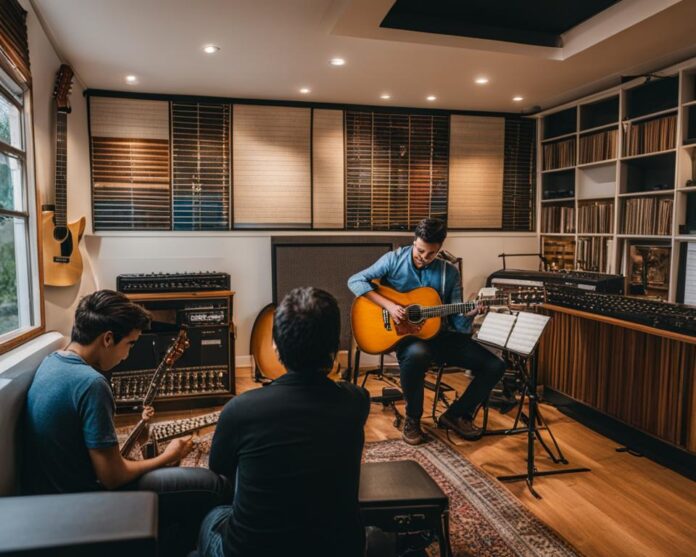Did you know that music education has been shown to improve language and reasoning skills in children, enhance cognitive abilities in adults, and reduce stress levels in people of all ages? With such powerful benefits, it’s no wonder that the demand for music instruction continues to grow.
If you are a talented musician with a passion for teaching, starting your own music lessons business can be a rewarding endeavor. Whether you specialize in instrumental lessons, vocal instruction, music theory, or technique, there are countless individuals who are eager to learn from you. But where do you begin?
In this article, we will guide you through the process of starting a music teaching business. We will explore the most common progression for music teachers, how to set up your studio, teaching options, payment methods, and effective strategies for promoting your business. By following these steps, you can turn your passion for music into a successful and fulfilling career.
Key Takeaways:
- Starting a music lessons business can be a rewarding endeavor.
- Music education provides numerous cognitive and wellness benefits.
- There is a growing demand for music instruction.
- Specialize in an area of expertise such as instrumental lessons, vocal instruction, music theory, or technique.
- Follow the steps in this article to build a successful music teaching business.
The Most Common Progression for Music Teachers
When starting your own music teaching business, it’s important to understand the most common progression followed by music teachers. By following this progression, you can lay a strong foundation for your business and pave the way for future success.
The journey typically begins by taking another job while teaching music lessons at home on the side. This allows you to have financial security while you build your music studio. As you gain more students and establish a solid reputation, you can then make the transition to teaching full-time.
Once your studio starts to grow, you might consider moving to a dedicated music studio location. This can provide a professional space where students feel comfortable and inspired to learn. Additionally, as your business continues to expand, you may have the opportunity to hire other music teachers to join your team and offer a wider range of lessons.
From there, the possibilities for growth are endless. You can explore options such as opening additional studio locations in different areas, offering online music lessons to reach students globally, or even providing in-home lessons for added convenience.
Here is an overview of the most common progression for music teachers starting their own businesses:
- Start by teaching music lessons at home while working another job.
- Transition to teaching full-time as your personal student base grows.
- Consider moving to a dedicated music studio location.
- Expand your business by hiring additional music teachers.
- Explore opportunities for further growth, such as opening more studio locations, offering online lessons, or providing in-home lessons.
By following this progression, you can build a thriving music teaching business and achieve full-time self-employment in the field you love.
Setting Up Your Studio
When it comes to setting up your music studio, there are several key factors to consider. From the location to the age group you wish to teach, each decision plays a crucial role in the success of your music lessons business.
Location
Choosing the right location for your music studio is essential. You want to be in an area where there is a demand for music lessons and where students can easily access your studio. Consider factors such as proximity to schools, residential areas, and transportation options.
Age Group
Determining the age group you want to teach is another important consideration. Whether you focus on young children, teenagers, adults, or a combination of age groups, tailoring your curriculum and teaching methods to their specific needs and interests is crucial for student engagement and satisfaction.
Genres
Identify the genres you are most qualified and passionate about teaching. Whether it’s classical, jazz, pop, or a mix of styles, offering a diverse range of genres can attract a wider range of students and cater to varying musical tastes and preferences.
Curriculum
Developing a comprehensive curriculum is essential for providing a structured learning experience for your students. Outline the skills, techniques, and music theory concepts you plan to cover at different levels of proficiency. Flexibility in adapting your curriculum based on individual student needs is also important for personalized instruction.
Studio Policy
Establishing a clear studio policy is crucial for maintaining professionalism and setting expectations with your students. Your policy should address important aspects such as your absence policy, billing process, make-up lessons, and other relevant details. This ensures transparency and prevents misunderstandings.
Rates
Determining your rates and pricing strategy is a key aspect of setting up your music studio. Consider factors such as your level of experience, market demand, the local competition, and the value you provide as a music teacher. Striking a balance between affordability for students and fair compensation for your expertise is essential.
With careful consideration of these factors, you can set up a music studio that caters to the needs of your target audience, provides an enriching learning environment, and positions your business for long-term success.
The Costs of Starting a Music Lessons Business
The initial costs of starting a music lessons business are relatively low. However, it’s important to consider a few key expenses as you set up your studio and embark on this exciting venture.
Investing in a High-Quality Musical Instrument
One of the main investments you need to make when starting a music lessons business is acquiring a high-quality musical instrument. If you don’t already own one, it’s essential to purchase an instrument that meets the standards of your chosen specialization. The quality of your instrument will significantly impact the sound and overall experience for your students.
Acquiring Studio Equipment
In addition to a musical instrument, you may need to invest in studio equipment to facilitate effective teaching sessions. Consider purchasing items like music stands, sound systems, and a comfortable desk to create a conducive learning environment for your students. Having the necessary equipment not only enhances the professionalism of your studio but also helps optimize the learning experience.
Considering Location Rental
When setting up your music lessons business, you may decide to rent a dedicated location for your studio. Renting a space provides a more professional setting for lessons and can help establish credibility with potential students. However, it’s important to factor in the cost of location rental in your financial plan. If you’re just starting and want to minimize expenses, teaching from your home or offering in-home lessons can be a cost-effective alternative.
Note: There are advantages and disadvantages to each teaching option, depending on your circumstances and preferences. We’ll explore these options further in Section 5.
An Overview of Initial Costs
| Expense | Estimated Cost |
|---|---|
| High-Quality Musical Instrument | $1,000 – $5,000+ |
| Studio Equipment | $500 – $2,000 |
| Location Rental (if applicable) | $500 – $1,500/month |
It’s important to note that these estimated costs can vary depending on factors such as your location, the type and quality of equipment you choose, and the rental rates in your area. Be sure to research and budget accordingly.
Teaching Options: In-Home, Online, or Studio
When it comes to teaching music lessons, you have various options to consider. Each option offers its own advantages and factors to consider in order to create an optimal learning environment for your students.
In-Home Lessons
One teaching option is to provide in-home lessons, where you travel to your student’s residence to conduct the lessons. This option offers convenience for the student, as they can learn from the comfort of their own home. However, offering in-home lessons requires additional time and cost for transportation, as you need to factor in travel time between locations. It’s essential to consider the distance and feasibility of traveling to multiple locations.
Online Lessons
Online lessons have gained popularity in recent years, offering a convenient and flexible option for both the teacher and the student. With online lessons, you can teach students from anywhere in the world, eliminating the need for physical proximity. This teaching option allows you to reach a broader audience and expand your teaching reach globally. Online lessons require a reliable internet connection and access to video chat platforms or online teaching platforms.
Teaching Studio
Another option is to teach from a dedicated teaching studio. A teaching studio offers a controlled environment specifically designed for music lessons. It provides a dedicated space for teaching where you can set up all necessary equipment and resources. Teaching from a studio can enhance the perception of professionalism and create a focused atmosphere conducive to learning. Additionally, having a designated studio may help with student retention and attracting new students who are looking for a structured learning experience.

Payment Methods and Policies
As a music teacher, it’s essential to establish clear payment methods and policies for your music lessons business. By doing so, you can ensure smooth transactions and set expectations for both you and your students.
When it comes to accepting lesson fees, you have several options for payment methods. Consider which methods are most convenient for you and your students. Here are some common payment methods:
- Cash: Accepting cash payments provides a simple and immediate way to receive lesson fees. However, it’s important to keep accurate records of these transactions.
- Bank transfers: Encourage your students to make payments through online bank transfers. This method offers convenience and can minimize the risk of lost or misplaced cash.
- Online payment platforms: Utilize popular online payment platforms such as PayPal or Venmo. These platforms allow for secure online transactions and provide an additional layer of convenience for both parties.
Note: Be sure to communicate your preferred payment methods to your students and provide clear instructions on how to make payments.
In addition to payment methods, it’s crucial to have a service agreement in place. This agreement outlines the terms and conditions of your music lessons business and helps protect both you and your students. Here are some key elements to include in your service agreement:
- Cancellation policy: Clearly state your cancellation policy, including any required notice periods and potential fees for cancellations made by students.
- Refund policy: Specify your policy on refunds. Determine whether refunds are available for missed lessons or in the event of a student’s withdrawal from lessons.
- Lesson rescheduling policy: Consider how you handle lesson rescheduling requests and clearly communicate your policy in the agreement.
- Code of conduct: Outline expectations for student behavior during lessons, including respect, punctuality, and preparedness.
Note: It’s essential to review the service agreement with each new student and have them sign to acknowledge their understanding and agreement to the terms.
By establishing clear payment methods and policies, you create a professional and transparent environment for your music lessons business. This helps ensure a smooth teaching experience and fosters trust and satisfaction among your students. Take the time to communicate your policies effectively, so everyone is on the same page.
Best Practices for Payment Methods and Policies
Here are some best practices to consider when it comes to payment methods and policies:
“Having a clear and concise service agreement is crucial to protect both the music teacher and the students. It sets a foundation for a professional and mutually beneficial relationship.” – Sarah Johnson, Music Teacher
| Best Practices | Benefits |
|---|---|
| Communicate payment expectations upfront | Prevents misunderstandings and ensures timely payments |
| Send payment reminders | Reduces the likelihood of late or missed payments |
| Offer multiple payment options | Increases convenience for students and improves accessibility |
| Regularly review and update your service agreement | Keeps your policies up-to-date and relevant |
Note: Consult with a legal professional to ensure your service agreement complies with applicable laws and regulations.
Promoting Your Music Lessons Business
Promoting your music lessons business is crucial for attracting students. To effectively reach your target audience, you can utilize a combination of traditional advertising methods and online marketing strategies. Here are some effective ways to promote your music lessons business:
- Traditional Advertising: Consider distributing flyers and placing ads in local music shops or schools. This will help you reach potential students and raise awareness about your services.
- Online Marketing: Creating a professional website is a great way to showcase your expertise and attract students. Optimize your website with relevant keywords and implement search engine optimization (SEO) techniques to improve your visibility on search engines.
- Social Media Presence: Establishing a strong presence on social media platforms like Facebook, Instagram, and YouTube can significantly boost your online reach. Regularly share engaging content, such as video tutorials or successful student performances, to engage with your audience and attract potential students.
- Utilize Online Platforms and Directories: List your music lessons business on popular online platforms and directories that cater to musicians and music students. This will help you reach a wider audience and increase your chances of attracting interested students.
Remember, effective promotion is an ongoing process and requires consistent effort. Evaluate the success of different marketing strategies and adapt your approach accordingly. By implementing a comprehensive marketing plan that combines both traditional and online methods, you can effectively promote your music lessons business and attract the students you desire.
Conclusion
Starting a music lessons business can be an incredibly fulfilling and rewarding journey. By following the steps and tips outlined in this article, you are well on your way to establishing a successful music instruction business. It all begins with careful planning and setting up your studio, ensuring it is in a convenient location and equipped with the necessary instruments and equipment.
Next, finding students is key to the success of your business. Utilize effective marketing strategies, such as online promotion, traditional advertising, and creating a strong online presence through social media platforms and a professional website. Take advantage of search engine optimization techniques to increase your visibility and attract potential students.
Lastly, remember that dedication, passion, and effective teaching techniques are essential to providing a high-quality music instruction experience. Continuously improve your skills, stay up to date with the latest teaching methods and trends, and always prioritize the success and growth of your students. With these principles in mind, you can unlock the full potential of becoming a music teacher and create a thriving music lessons business.
FAQ
What is the most common progression for music teachers starting their own business?
The most common progression for music teachers starting their own business is to take another job while teaching at home on the side. Once you have enough personal students, you can quit your job and focus on teaching full-time. As your studio grows, you may consider moving to a storefront and hiring other teachers. From there, you can scale your business with more locations, online lessons, or in-home lessons.
How do I set up my music studio?
When setting up your music studio, you need to consider the location. Your studio should be in an area where there is a demand for music lessons and easily accessible for students. Determine the age group you wish to teach and the genres you are qualified to teach. Develop a curriculum and teaching approach that aligns with your expertise. It’s important to have a studio policy in place to outline your absence policy, billing process, and other important details. Finally, determine your rates and pricing strategy based on your experience, market demand, and competition.
What are the costs associated with starting a music lessons business?
The initial costs of starting a music lessons business are relatively low. The main investment is a high-quality musical instrument if you don’t already own one. You may also need to purchase studio equipment like music stands, sound systems, and a desk. If you decide to rent a location for your studio, that will be an additional cost. However, you can start by teaching from your home or offering in-home lessons to minimize expenses.
What teaching options are available for music lessons?
There are different options for teaching music lessons, including in-home lessons, online lessons, or teaching from a studio. In-home lessons provide convenience for the student but require additional time and cost for transportation. Online lessons have become increasingly popular and allow you to reach students globally. Having a teaching studio offers a dedicated space for lessons and can enhance the perception of professionalism.
How should I handle payment methods and policies for my music lessons business?
As a music teacher, you will need to determine your preferred payment methods for accepting lesson fees. You may choose to offer a lesson-by-lesson basis or require advanced payment for a set number of lessons. It’s important to have a service agreement that outlines your cancellation policy, refund policy, and other terms and conditions. This helps protect both you and your students, ensuring clear expectations and guidelines.
What are some strategies for promoting a music lessons business?
Promoting your music lessons business is crucial for attracting students. You can utilize traditional advertising methods such as flyers and ads in local music shops or schools. Online marketing is also essential, including creating a website, social media presence, and using search engine optimization techniques to improve your visibility on search engines. Utilize online platforms and directories to reach potential students and showcase your expertise.


